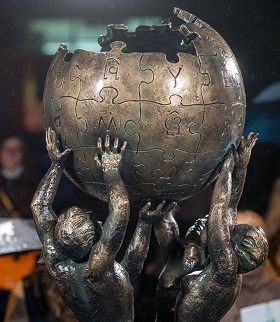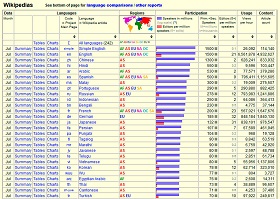Ru.Wikipedia — How Hard Is It to Exist in the New Russia?
Stanislav Kozlovsky, the executive director
of Wikimedia Russia
(no votes) |
(0 votes) |
In the wake of Roskomnadzor’s announcement that Russian Wikipedia may be shut down, the editors of the RIAC webpage have asked the executive director of Wikimedia Russia to share his ideas on the situation. In the interview below, Stanislav Kozlovsky describes the structure of Wikipedia, the copyright aspect and how the Russian Law on Foreign Agents has influenced ru.wikipedia.org
In the wake of Roskomnadzor’s [1] announcement that Russian Wikipedia may be shut down, the editors of the RIAC webpage have asked the executive director of Wikimedia Russia to share his ideas on the situation. In the interview below, Stanislav Kozlovsky describes the structure of Wikipedia, the copyright aspect and how the Russian Law on Foreign Agents has influenced ru.wikipedia.org
Internet encyclopaedias replaced classical information sources long ago. Where do you get your information? Do you still use paper sources?
I read printed books. As for encyclopaedias, you have to remember that their main purpose is to provide quick access to information. I often find myself typing a word into Google and quickly looking it up there, because it is easier than turning in my chair and grabbing a book from one of my shelves.
Where do you watch or read the news?
On TV, I watch the Discovery channels and Nauka 2.0. I read what they write on Twitter and Facebook. I only turn to news sites if there is an event that is not to be missed. I don’t keep track of the news constantly.
At universities Wikipedia references are to be avoided when doing an academic assignment. What is your take on the situation?
I think they are right to do so. The people who write for or work with Wikipedia are more critical of it than the readers. I agree that Wikipedia is not an authoritative source, but all the facts in it must have references to genuine resources. There is no information in Wikipedia that the contributor just thought up (if that happens, it is removed). Classical encyclopaedias enlist academics whose authority is indisputable. Our approach is different. We mistrust all contributors from the outset, whatever they may say about themselves. Everything they write should be backed up by references to authoritative sources. Blogs as a rule do not count as authoritative sources.
Just think about it: scientific monographs of the late 19th and early 20th centuries did not really include lists of literature used at all. The authors didn’t cite sources because the readers were supposed to trust their authority and take them at their word. If you look at modern scientific articles, the lists of sources cited are often longer than the actual article. Wikipedia follows the same principle.
So, you verify information by analysing the references. Is it possible to keep track of all the information that is published?
It’s hard. This is why Wikipedia’s approach is different from that of classical encyclopaedias, which have editors who read through them. The Russian version of Wikipedia has 1.5 million registered contributors who edit it, in addition to the 20 to 30 million readers a day who can make corrections or alert the authors to errors or inaccuracies.
After a person has written an article, he or she can see the additions introduced by other users. Corrections can be cancelled or restored. No other source has so many pairs of eyes watching it than Wikipedia.
Often an article in Russian has less information than the same article in English. Are articles translated or written from scratch?
Of course, it is possible to translate. But the people who work for Wikipedia do so because they are interested in the topic, while translating someone else’s text is boring and doesn’t make much sense. The authors do, of course, look at what is written in other languages (if they happen to know them), but as a rule it is only one of the many sources of information used when writing an article. Thus, they can discover facts they may never have even noticed. For example, the years when ancient philosophers lived: Russian sources could give one figure, English sources another and Greek sources a completely different one. This raises the question: who is right? A thorough look into the matter ensues to discover where the discrepancy has occurred.
What about copyright protection? Is illegal downloading an obstacle to business?
Unfortunately, copyright laws are generally too harsh. Copyright is based on the 1886 Berne Convention for the Protection of Literary and Artistic Works. The internet did not exist at the time, there were not as many authors as today, the content had very limited circulation and it was very valuable. These days, even blog comments are protected by copyright. The majority of works completed in the 20th century are protected by copyright. And it is practically impossible to find the inheritors of the copyright to a given work and make a deal with them 70 years after the author’s death. The entire Soviet legacy has been lost and although we don’t need the texts all that much, illustrations of certain events unfortunately cannot be used. Wikipedia follows the Creative Commons Attribution-ShareAlike principle. This means that anyone can use it, including for commercial purposes, provided that they cite Wikipedia. After all, what is Wikipedia? It is the largest association of authors who contribute, without any kind of remuneration, so that their work can be used freely.
The recent developments prompt a question: is freedom of the press and freedom to interpret information an illusion? Is there a danger that we could slip back into the era of strict censorship?
Nobody knows what Roskomnadzor thinks; I don’t think they even know what to think themselves. For Wikipedia, it’s business as usual: we write encyclopaedia entries that do not break any laws. Unfortunately, the Russian law is couched in such a way that it can be interpreted very broadly, so instead of fighting drug traffickers, they start fighting encyclopaedias. Wikipedia has never carried any instructions on how to cook borsch or how to prepare drugs. We do not publish instructions, let alone fight anyone. If they want to block Wikipedia, we say, “OK. Go ahead.”
Does Wikipedia position itself as a symbol of the freedom of information? As soon as reports appear about your website potentially being blocked, you give instructions on how to get around it (for example, with the help of anonymizers and Tor). Do you believe that information can and must be obtained by any means?
The law does not forbid bypassing blocked sites, you can type “how to bypass a blocked site” in any search engine and you will be offered 50 various ways, each more simple, easy and understandable than the next. The Russian Constitution proclaims “the right to seek and obtain information”. This is our country’s main law, the basis of Russian statehood and it cannot be challenged.
Why Wikipedia can turn down an article?
Articles are removed without discussion if they contain patent trash, for example, a jumble of meaningless symbols or advertising. In cases where it is not clear, anyone can suggest deleting an article, whereupon Wikipedia participants discuss whether or not it should be deleted. There are several criteria for assessing these kinds of things. First, an article is deleted if the text is in violation of copyright. Second, an article can be deleted if the topic is insignificant. For example, two high school pupils form a band and write an “article” about it. It is liable to be deleted from Wikipedia because the band does not match the relevance criterion. All information is subject to verification.
Jimmy Wales, the founder of Wikipedia, said that its aim is to make the world better. What does that mean to you?
Jimmy formulated our aims like this: Imagine a world in which every single human being can freely share in the sum of all knowledge. That's our commitment. In many ways, we have already achieved this goal: practically anyone who has internet access has all human knowledge at his or her fingertips for free. Perfection can never be achieved, and we are fairly critical of Wikipedia, but we are still working so that everyone can have access to knowledge and take part in collecting and studying it.
How is the Russian office financed following the adoption of the Law on Foreign Agents in Russia? Are donations enough to keep you going? Are Russian citizens actively involved in this process?
Things are really bad at the moment. We have been losing money for years now, ever since the Law on Foreign Agents was passed. We live on money that was raised before the law came into effect and it will soon run out. We don’t know what lies down the road. All the money we have has come in the shape of donations, which for the most part do not come from readers but from our contributors. At present, we raise 30,000-40,000 roubles a month. For an organization, that is way too little.
What are the most frequently asked questions among Russian-speaking users?
We do not look at questions, we track down the number of hits for articles. The most frequently visited articles invariably are “Russia”, “Putin” and so on. Interest in some pages spikes when hot information is published, but it fades quickly. We have noticed a strange thing: some of the most popular articles include “job”, “work”, “unemployment” and so on. We suspect that in some organizations, when people try to access social networks they are redirected to these pages.
What is Wikipedia’s policy with regard to articles on hot political topics (for example, the Ukrainian crisis)?
All the entries should be as neutral as possible. There should be no opinions, only the bare facts. The Russian version of Wikipedia is mainly written by contributors from Russia, but there are many Russian-speaking contributors from other countries, including of course Ukraine. The authors have different views on events, but one of the main rules of Wikipedia is that the articles should be as neutral as possible. The participants discuss an issue and arrive at a wording with which everyone agrees. Often every sentence comes under scrutiny. Sometimes “a war of amendments” flares up. Emotional arguments are ignored and as a result the texts are fairly neutral. We do not take sides and do not engage in politics. We provide facts only, without any value judgments.
Interviewed by Maria Smekalova, RIAC web editor
1. Russian Federal Service for Supervision in the Sphere of Telecom, Information Technologies and Mass Communications
(no votes) |
(0 votes) |





